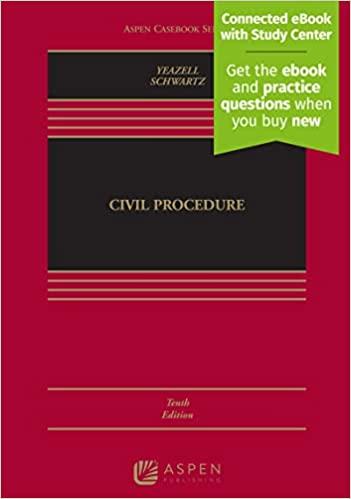Answered step by step
Verified Expert Solution
Question
1 Approved Answer
What has been a long-practiced method of getting confessions out of those accused and/or charged with a crime?When did the US Supreme Court finally invalidate
- What has been a long-practiced method of getting confessions out of those accused and/or charged with a crime?When did the US Supreme Court finally invalidate a confession made under those circumstances?How did the Courts extend this ruling in 1944?
- What is the rule that the Supreme Court has adhered to with regard to the validity of confessions?
- What is a 'totality of the circumstances' test used to determine and what is taken into consideration to make that determination?Why is it difficult to apply?
- What was the decision inEscobedo v. Illinois?How did Miranda v. Arizona impact this ruling? HowEdwards v. Arizonaelaborate this finding?
- What is the linguistic issue raised by these cases?
- How could one directly invoke the Right to Counsel?What are some indirect requests?Provide some examples.
- How are requests for counsel comparable to the speech used in ordering from a menu?
- How have the Courts ruled in past cases to determine whether the accused made a request for counsel?Do they consider the suspect's 'communicative intent'? What was the rulingin People v. KruegerandPeople v. Kendricks?What linguistic device did the suspects in these cases use perhaps because they were under arrest and felt powerless?
- How have the Courts tended to rule with regard to the validity of a suspect's assertion for the right to counsel? What is wrong with this?
- What is the 'threshold of clarity standard'? What is theper seapproach?What is the clarification standard?
- How do some interrogators clarify an ambiguous invocation of counsel?Why?
- How does the power structure of the situation (arresting officers vs. suspect) play a role in the invocation of counsel?
- What would the Courts have to take into account to ensure that the accused's request for counsel is honored?What was the decision in Davis v. US and how did it impact the validation of whether a request for counsel during an interrogation had occurred?
- What happened in Rhode Island v. Innis and what did the Court decide?How was the Court more sophisticated linguistically?What did the Court find in Brewer v. Williams?What was the difference in the 2 rulings regarding the nature of the discourse, i.e., whether the officers had interrogated the suspects or not?And what is the possible explanation for the different interpretations?
- How do the Courts typically decide whether an action or utterance is the functional equivalent of a question/interrogation after a suspect has invoked his/her right to counsel? (pp 62-66)
- How can the interpretation of an utterance or an action as the functional equivalent of questioning be problematic? Which cases raise the issue of whether an indirect utterance or an action should be interpreted as questioning?What do Solan & Tiersma recommend that the Courts adopt?(pp.65-66)
https://1lib.us/book/990436/d1be4b
Step by Step Solution
There are 3 Steps involved in it
Step: 1

Get Instant Access to Expert-Tailored Solutions
See step-by-step solutions with expert insights and AI powered tools for academic success
Step: 2

Step: 3

Ace Your Homework with AI
Get the answers you need in no time with our AI-driven, step-by-step assistance
Get Started


